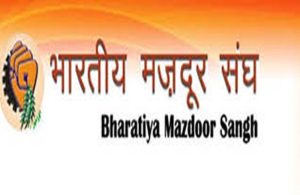By Virjesh Upadhyay
Director General, Dattopant Thengadi Foundation
Trade unions in Bharat stand today at a critical crossroads. For decades, they have focused on issuing charters of demands – lists of expectations from employers and policymakers. But the world of work has changed fundamentally, and with it must change the very purpose, mindset and functioning of our unions.

The majority of Bharat’s workforce is in the unorganized sector, and millions more are joining gig and platform-based jobs. Yet trade unions, by and large, continue to work with approaches shaped in the industrial economy of the mid-20th century. They remain preoccupied with routine negotiations for wage hikes or benefits, missing the larger shifts happening in the nature of employment itself.
If trade unions continue to act merely as petitioners submitting demands, they risk irrelevance. The real need of the hour is for unions to become charters of command – to stand as dynamic, forward-looking institutions that guide, organize, and empower workers to navigate the complexities of today’s economy.
This requires trade unions to start with internal transformation. Fragmentation among unions must give way to unity. Disputes over political alignment or ideological turf have long weakened the collective power of labor. Workers across sectors, regions, and affiliations must find common cause in unions that prioritize worker welfare over internal rivalry.
Equally important is the need for unions to modernize their strategies. Traditional tools like strikes or dharnas cannot alone address challenges faced by today’s workers in platform-based and digital jobs, or the informal sector where employment relationships are often hidden or disguised. Modern unions must adopt technology for organizing workers, leverage data to highlight patterns of exploitation, and use social media and innovative outreach to reach workers who remain invisible in traditional workplaces.
Unions must also shift from reactive to proactive leadership. Rather than waiting for problems to erupt or benefits to be denied, they should anticipate changes – like new forms of employment contracts, automation trends, or emerging industries – and prepare workers through awareness, training, and advocacy. This proactive approach will build credibility and make unions true partners in workers’ growth.
Another vital area is restoring workers’ trust. Many workers today see unions as platforms for political battles rather than for their welfare. Unions need to show by action – not words – that every worker, whether in permanent employment or on daily wages, will find support, guidance, and solidarity.
Most importantly, unions must embrace a worker-first culture, one that prioritizes practical solutions over slogans, dialogue over confrontation, and education over mere agitation. This means equipping workers with skills to adapt to new technologies, helping them understand their rights and responsibilities, and creating systems to resolve disputes swiftly.
By focusing on these internal corrections – unity, modernization, proactive strategies, trust-building, and a worker-first approach – trade unions can once again become true centres of strength. They will not just raise demands, but shape the narrative of labor in Bharat, commanding respect and ensuring that workers’ interests remain protected and prioritized in a rapidly changing world.
In the evolving dynamics of our economy and society, unions have a historic opportunity to transform themselves from issuers of demands to architects of workers’ future. The time to act is now.
